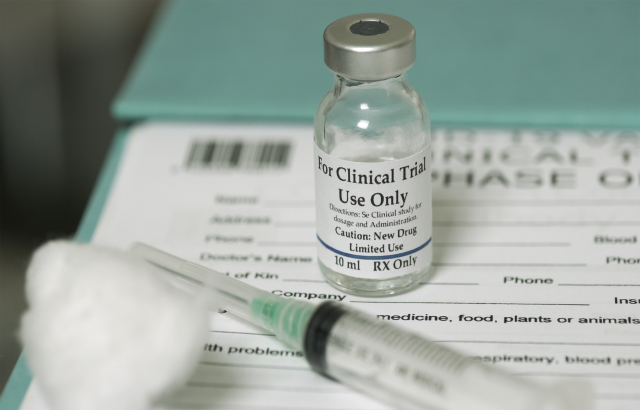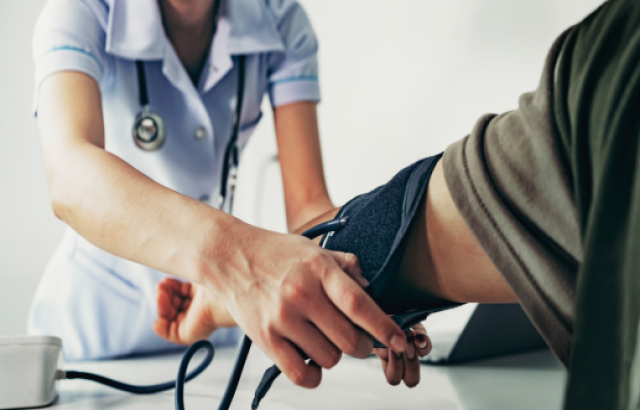

A clinical trial is the gold standard way to test whether a new treatment is safe and beneficial for the people receiving it.

In its simplest form, a clinical trial involves taking a group of patients and then randomly assigning them (like using the throw of a dice) into two groups – one group is given a test treatment and the other group (the control group) is given either a dummy drug (placebo) or another standard treatment. The trial participants are followed up for a period of time and carefully chosen health outcomes are compared between the two groups.
In a classic trial, neither the participants nor the researchers knows what group they have been assigned to – a process called blinding or masking. And because participants have been randomly split into groups, people in the treatment and control groups should be similar in terms of their average age, sex and any pre-existing health problems that could potentially influence the results. This means that the trial should be a fair and true test of whether the new treatment works or not. Not all trials are about testing new treatments – they can also test new ways of preventing or diagnosing a condition, they can compare different combinations of standard treatments, or even different ways of taking a treatment.
This may all sound quite simple, but clinical trials are notoriously difficult to conduct. Researchers have to recruit sometimes many thousands of patient volunteers into the trial from hospitals or clinics across the UK, or even from other countries. The team has to make sure that the sites recruiting patients are all following the trial procedures correctly and that they’re monitoring the safety of the participants carefully. Last, but not least, clinical trials rely on the good will of patient volunteers, who have to consent to take part in the trial and agree to be followed up by the research team for many years.
TIME has told
It has been a tough time for researchers conducting clinical trials, with the Covid-19 pandemic making it hugely difficult to recruit and follow up participants. But despite these challenges, two of our trials recently announced exciting results.
The TIME trial, led by Professor Tom MacDonald at the University of Dundee, asked an intriguing question about treating high blood pressure: does it matter whether you take high blood pressure tablets in the morning or the evening?

Why would the time of day that you take tablets affect your health? Our blood pressure naturally follows a daily cycle – falling at night and rising in the morning. There is some evidence that taking blood pressure tablets in the evening lowers blood pressure throughout the whole night, mimicking the body’s natural blood pressure rhythms and, in turn, controlling overall blood pressure levels better. But the big question – does night time dosing prevent the feared complications of high blood pressure (such as strokes and heart attacks) better than morning dosing – needed to be tested in a large scale trial.
TIME recruited over 20,000 participants with high blood pressure using an innovative design. The entire trial was run remotely, without any face-to-face research visits. Participants logged into a secure website to self-enrol. They were then randomly assigned to either take their usual blood pressure tablets in the morning (between 6am and 10am) or in the evening (between 8pm and midnight) for the duration of the trial. Every 3 months, they received an email reminding them to fill in a short online questionnaire about their health. The team also followed up participants for around 5 years using routinely collected electronic health records.
TIME found that there was no difference in the number of people who had a heart attack, stroke or died between the two groups. This conclusively showed that morning blood pressure tablets are as effective as evening dosage in treating high blood pressure.
Between seven and nine million people in the UK are prescribed blood pressure lowering medications. But despite these treatments being effective, many people don’t take their tablets regularly. The results of the TIME trial mean that people with high blood pressure can choose to take their tablets at a time of day that suits them best, and when they are most likely to remember to do so.
IRONMAN
IRONMAN – a flagship BHF-funded trial involving people with heart failure – reported its results at the American Heart Association meeting this month. Professor Paul Kalra from Portsmouth Hospitals University NHS Trust led the trial, together with Trial Director, Professor Ian Ford, from the University of Glasgow.
Up to half of people with heart failure have low iron levels and this lack of iron has been linked to worse symptoms, lower quality of life, and a greater risk of hospitalisation and death. IRONMAN tested if regular intravenous infusions of iron (where iron is delivered into a vein through a drip) could benefit people with heart failure and iron deficiency in the long term.
The trial recruited over 1000 people with heart failure and iron deficiency and followed them up for an average of 2.7 years. Half of the participants were assigned to have regular intravenous iron infusions, on top of their usual heart failure treatment, if their blood iron levels were low, and the other half continued receiving their usual care.
True to its name, the IRONMAN investigators and participants had to show a steely resolve to ensure that the trial completed successfully. The Covid-19 pandemic struck in the middle of the trial and many participants could not go into hospital to have their top-up iron injections. Nonetheless, the triallist were able to follow up most of the participants either by telephone or through electronic health records, and the trial was able to conclude successfully.
IRONMAN found that the risk of being hospitalised for heart failure or dying from a heart related cause was 18 per cent lower in the group given iron infusions compared with usual care. And people who received iron infusions also reported a better quality of life at four months. When the team looked at the data from the participants who were part of the trial before Covid-19 struck, and whose treatment wouldn’t have been as affected by the pandemic, the results showed an even stronger benefit of iron infusions over usual care.
This is exciting news for people with heart failure. Most of the people in the iron group received just one or two infusions during the trial to keep their iron levels up, equating to an iron infusion every one to two years. The infusion itself takes about half an hour to be administered, and after a short observation period, patients can go home. IRONMAN showed that this simple treatment can make a real difference to patients with heart failure.
If you want to hear more about IRONMAN, come and join us at this month’s Live & Ticking, where Professor Kalra is talking about the trial, and what it means for heart failure patients.


